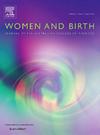‘Still struggling, but there is a small glimmer of light at the end of the tunnel’ – Individual in-depth interviews six-months after stillbirth: A follow-up study in Sweden
IF 4.1
2区 医学
Q1 NURSING
引用次数: 0
Abstract
Background
Few parents experience stillbirth in Sweden, and their perspectives on the grieving process remain largely unknown.
Objective
To explore parents’ perspectives, memories, reflections and insights in the grieving and recovery process six months after stillbirth.
Methods
A mixed-method study involving nine in-depth interviews and responses to eleven quantitative statements. Data were analysed using descriptive statistics and thematic network analysis.
Results
Two themes were identified ‘Retained indelible deep memories of the loss and increased insights into the tragic life-changing event’ and ‘The continued grieving process, quality of life and new pregnancy’. These themes captured parents’ ongoing grief and reflections. Six months later, parents reported gaining insights into unforeseen pregnancy abnormalities. Some announced new pregnancies, desiring extended medical checks by both midwives and obstetricians. There was a widespread request for tailored psychological support throughout pregnancy. Qualitative findings were reinforced by the quantitative statements.
Conclusions
Stillbirth profoundly affects parents long-term, with deep grief and memories. They develop coping strategies to strengthen their mental health. However, after six months, they begin to see a small glimmer of light at the end of the tunnel.
“仍在挣扎,但隧道尽头有一线曙光”——瑞典的一项随访研究:死产6个月后的个人深度访谈
在瑞典,很少有父母经历过死胎,他们对悲伤过程的看法在很大程度上仍然未知。目的探讨死产6个月后父母在悲痛和恢复过程中的观点、记忆、反思和见解。方法采用混合方法进行研究,包括9个深度访谈和11个定量陈述的回答。数据分析采用描述性统计和专题网络分析。结果确定了两个主题:“保留对失去亲人的不可磨灭的深刻记忆,增加对改变生活的悲惨事件的洞察力”和“持续的悲伤过程,生活质量和新怀孕”。这些主题捕捉到了父母们持续的悲伤和反思。六个月后,父母们报告说,他们发现了意外的妊娠异常。有些人宣布怀孕,希望助产士和产科医生进行更多的医疗检查。在整个怀孕期间,普遍要求提供量身定制的心理支持。定量的陈述加强了定性的发现。结论死产对父母的影响是长期的,具有深刻的悲伤和记忆。他们制定应对策略来加强他们的心理健康。然而,六个月后,他们开始看到隧道尽头的一丝曙光。
本文章由计算机程序翻译,如有差异,请以英文原文为准。
求助全文
约1分钟内获得全文
求助全文
来源期刊

Women and Birth
NURSING-OBSTETRICS & GYNECOLOGY
CiteScore
7.20
自引率
13.20%
发文量
371
审稿时长
27 days
期刊介绍:
Women and Birth is the official journal of the Australian College of Midwives (ACM). It is a midwifery journal that publishes on all matters that affect women and birth, from pre-conceptual counselling, through pregnancy, birth, and the first six weeks postnatal. All papers accepted will draw from and contribute to the relevant contemporary research, policy and/or theoretical literature. We seek research papers, quality assurances papers (with ethical approval) discussion papers, clinical practice papers, case studies and original literature reviews.
Our women-centred focus is inclusive of the family, fetus and newborn, both well and sick, and covers both healthy and complex pregnancies and births. The journal seeks papers that take a woman-centred focus on maternity services, epidemiology, primary health care, reproductive psycho/physiology, midwifery practice, theory, research, education, management and leadership. We also seek relevant papers on maternal mental health and neonatal well-being, natural and complementary therapies, local, national and international policy, management, politics, economics and societal and cultural issues as they affect childbearing women and their families. Topics may include, where appropriate, neonatal care, child and family health, women’s health, related to pregnancy, birth and the postpartum, including lactation. Interprofessional papers relevant to midwifery are welcome. Articles are double blind peer-reviewed, primarily by experts in the field of the submitted work.
 求助内容:
求助内容: 应助结果提醒方式:
应助结果提醒方式:


